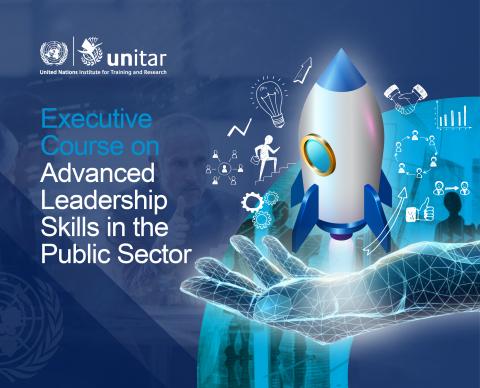
UNITAR Online Catalogue
Executive Course on Advanced Leadership Skills in the Public Sector

People
Background
Getting the most from people and organisations requires strong leadership skills. As products and services become more complex and the role of knowledge workers becomes more critical in the success of an organisation, it is essential to know how to lead and how to motivate.
Great leaders are known for their strong vision, the care they offer for their team, sheer passion for their cause and the tremendous support they provide to help people grow and become better at what they do.
This course covers a variety of topics on leadership and communication skills. It is ideal for those who have had some experience in managing or supervising people and want to improve their skills further.
Since delegates already have some experience in management, this course is designed to address various practical issues that leaders encounter every day and provides strategies on handling them. It is packed with exercises, examples and case studies so delegates are constantly pushed to think and re-examine their own attitudes when dealing with people. They learn numerous techniques that will help them improve their interactions and to build trust. A great part of a leader’s role is motivating his team and people around him. This is strongly reflected in various techniques used throughout the course as delegates come across this concept over and over again.
The course provides examples on decision making, delegation skills, managing people and resources, managing brainstorming sessions and so on. In addition, delegates get to practice giving short talks to their team or clients in order to improve their public speaking skills.
Learning Objectives
At the end of this course, you will be able to:
- Evaluate your leadership role within the complex systems of your organization
- Determine ways to build resilience within yourself and your teams to foster an emotionally intelligent organization
- Devise a plan that enables you to improve your organization's culture
- Develop a strategy for creating and managing change in your organization
- Use targeted strategic thinking practices to communicate more effectively
- Select appropriate leadership language to enhance your interpersonal communication
- Illustrate a plan for fostering an ethical organization focused on serving others
Content and Structure
Module 1: Managing Your Team’s Aspirations
- How to set effective goals for your team
- How to prepare for brainstorming sessions
- How to help your team to generate ideas so you can benefit from everyone’s inputs
Module 2: Systematic Planning
- Why some managers are known to be too confusing or demanding? How can you avoid this?
- What is the 5-steps planning technique and how can it be used for problem solving, brainstorming and general planning?
- How can you use business planning guidelines to improve your leadership?
Module 3: Giving a Speech
- How can you improve your public speaking and presentation skills?
- How can these strategies benefit you when addressing your team?
- What strategies help you improve the opening of your public talks, whether addressing your team, your clients or your stakeholders?
Module 4: Managing People
- How can you improve your communication skills with your team by putting yourself in their position?
- What strategies help you gather more information about difficult cases, before expressing your dissatisfaction or saying something that you could regret afterwards?
Module 5: Delegation Skills
- What are various levels of delegation and what can you delegate in each level?
- How to select a delegation level based on how much control you want to retain and how much time you want to save
- What strategies help you formulate your request when delegating a task to motivate the person?
- What strategies help you minimise disruption to other team members so you can manage your team effectively as a whole?
Methodology
The course is based on UNITAR’s sound adult learning pedagogical principles. Each module includes interactive readings, self- assessment activities and quizzes. The learning activities are distributed in such a way to ensure the achievement of the learning objectives in a flexible manner.
Additional Information
A certificate of completion will be issued to participants who achieve a course total of 70% or above. A certificate of participation will be issued to participants who achieve a final course score lesser than 70%.